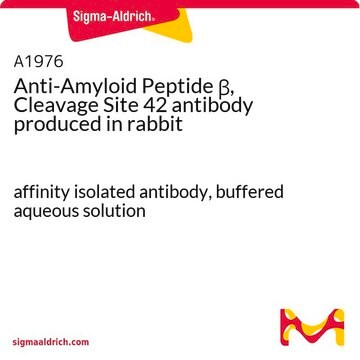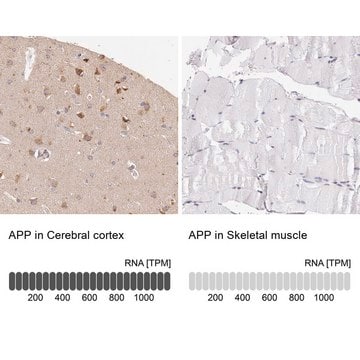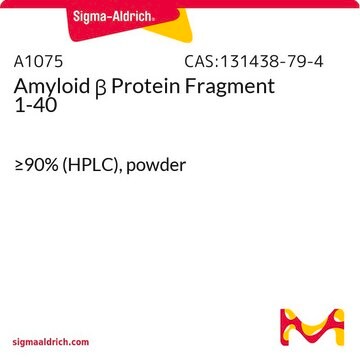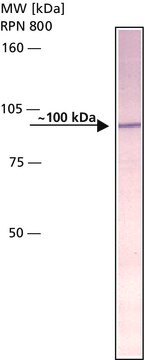推荐产品
生物源
rabbit
共軛
unconjugated
抗體表格
whole antiserum
抗體產品種類
primary antibodies
無性繁殖
polyclonal
形狀
liquid
包含
15 mM sodium azide
物種活性
human
加強驗證
independent
Learn more about Antibody Enhanced Validation
技術
immunohistochemistry (formalin-fixed, paraffin-embedded sections): 1:100 using human Alzheimer’s disease (AD) brain tissue
indirect ELISA: 1:4000-1:8000
UniProt登錄號
運輸包裝
dry ice
儲存溫度
−20°C
目標翻譯後修改
unmodified
基因資訊
human ... APP(351)
一般說明
淀粉样蛋白前体蛋白(APP)是分子量70 kDa的跨膜糖蛋白家族的成员,存在于多种组织中。APP在大脑中表达。它位于人类21号染色体上。APP具有3种主要同种型,即APP695、APP751和APP770,它们来自于细胞的可变剪接事件。
免疫原
与BSA偶联的合成β-淀粉样蛋白(1-40)。
應用
兔抗-β-淀粉样蛋白(1-40)抗体可用于:
- Aβ肽的免疫细胞化学定位
- 免疫细胞化学
- 免疫沉淀
- 聚集超声微泡增强抗体递送(FUS-MB)
生化/生理作用
β-淀粉样蛋白前体蛋白 (APP) 是由蛋白水解酶β-分泌酶 (BACE1) 和 γ-分泌酶依次裂解,生成以Aβ1-42和 Aβ1-40型为主的β-淀粉样蛋白 (Aβ) 肽。分泌的Aβ肽通过再吸收机制和之后的内体降解过程降解,或通过胞外胰岛素降解酶降解。Aβ的胞外积累导致聚集体和原纤维的形成,最终形成淀粉样蛋白沉着物神经炎斑,其是阿尔茨海默病 (AD) 的标志物。
兔抗-β-淀粉样蛋白 (1-40) 抗体不会对正常脑组织的对照部分进行染色。
兔抗-β-淀粉样蛋白 (1-40) 抗体不会对正常脑组织的对照部分进行染色。
外觀
兔抗-β-淀粉样蛋白(1-40)以包含0.1%叠氮化钠(作为防腐剂)的液体形式提供。
免責聲明
除非我们的产品目录或产品附带的其他公司文档另有说明,否则我们的产品仅供研究使用,不得用于任何其他目的,包括但不限于未经授权的商业用途、体外诊断用途、体外或体内治疗用途,或人类或动物任何类型的消费或使用。
Not finding the right product?
Try our 产品选型工具.
相關產品
产品编号
说明
价格
儲存類別代碼
10 - Combustible liquids
水污染物質分類(WGK)
WGK 3
閃點(°F)
Not applicable
閃點(°C)
Not applicable
其他客户在看
Learning performances, brain NGF distribution and NPY levels in transgenic mice expressing TNF-alpha
Fiore M, et al.
Behavioural Brain Research, 112(1), 165-175 (2000)
Yanfang Rui et al.
Molecular brain, 9(1), 79-79 (2016-08-19)
Small oligomeric forms of amyloid-β (Aβ) are believed to be the culprit for declined brain functions in AD in part through their impairment of neuronal trafficking and synaptic functions. However, the precise cellular actions of Aβ oligomers and underlying mechanisms
Jhana O Hendrickx et al.
International journal of molecular sciences, 22(13) (2021-07-03)
Increasing epidemiological evidence highlights the association between systemic insulin resistance and Alzheimer's disease (AD). As insulin resistance can be caused by high-stress hormone levels and since hypercortisolism appears to be an important risk factor of AD, we aimed to investigate
Scott B Raymond et al.
PloS one, 3(5), e2175-e2175 (2008-05-15)
Alzheimer's disease is a neurodegenerative disorder typified by the accumulation of a small protein, beta-amyloid, which aggregates and is the primary component of amyloid plaques. Many new therapeutic and diagnostic agents for reducing amyloid plaques have limited efficacy in vivo
S Benjannet et al.
The Journal of biological chemistry, 276(14), 10879-10887 (2001-01-22)
Processing of the beta-amyloid precursor protein (betaAPP) by beta- and gamma-secretases generates the amyloidogenic peptide Abeta, a major factor in the etiology of Alzheimer's disease. Following the recent identification of the beta-secretase beta-amyloid-converting enzyme (BACE), we herein investigate its zymogen
我们的科学家团队拥有各种研究领域经验,包括生命科学、材料科学、化学合成、色谱、分析及许多其他领域.
联系技术服务部门










